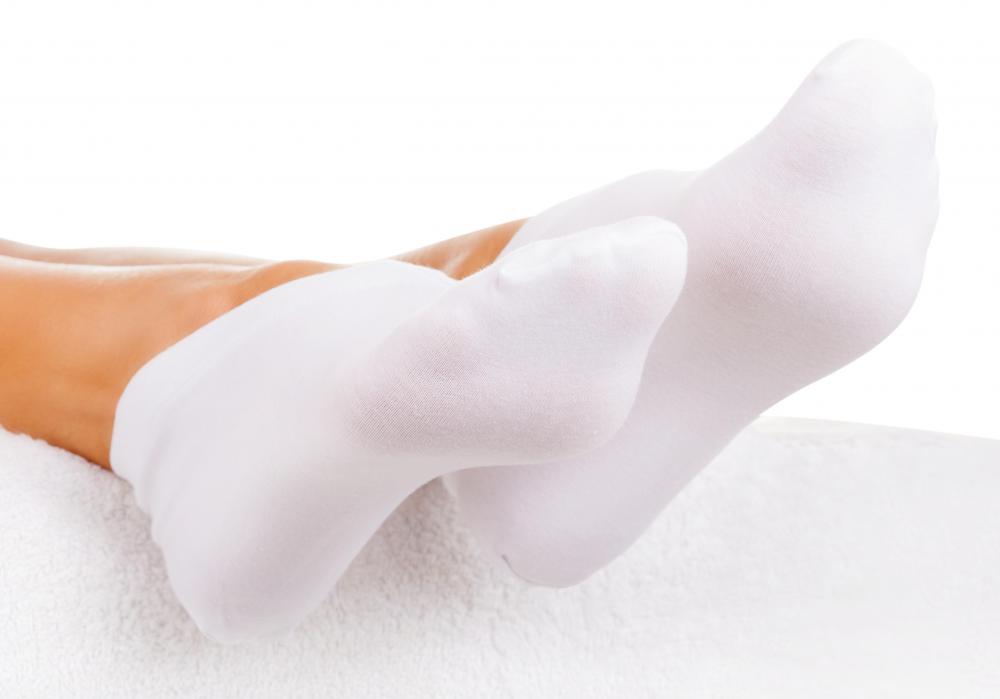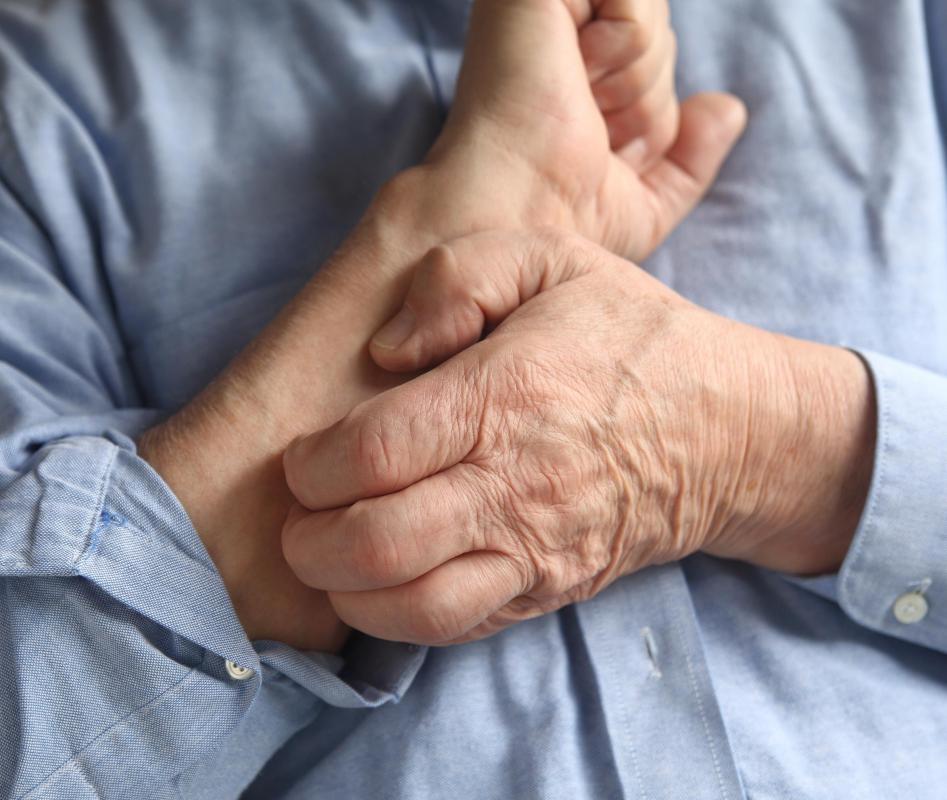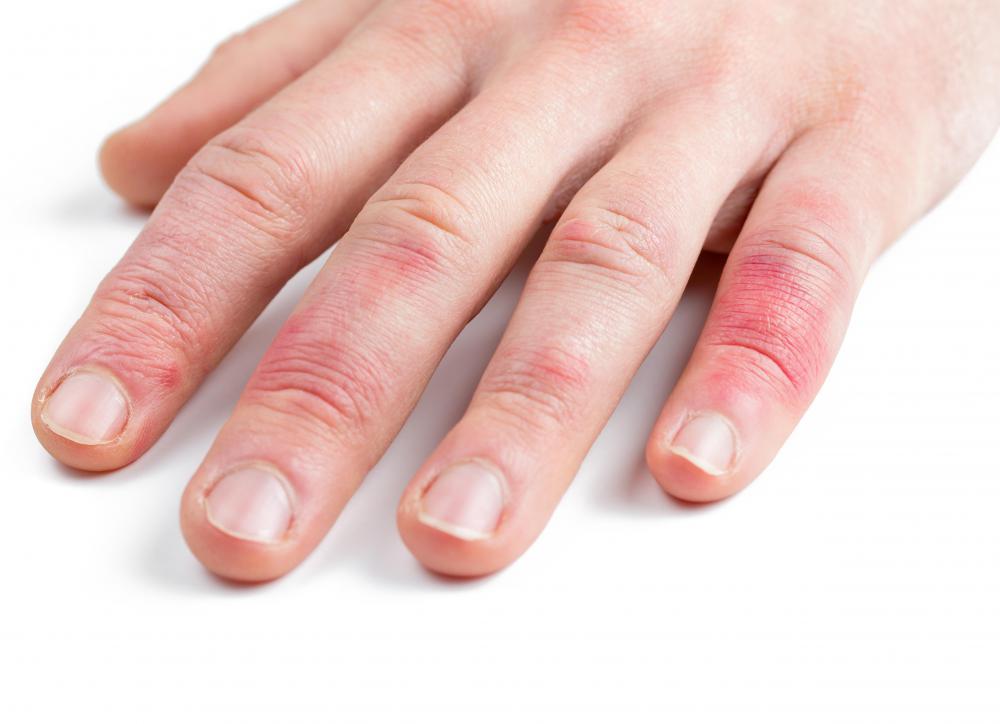At TheHealthBoard, we're committed to delivering accurate, trustworthy information. Our expert-authored content is rigorously fact-checked and sourced from credible authorities. Discover how we uphold the highest standards in providing you with reliable knowledge.
What are Common Causes of Blisters?
A blister is a small pouch made of skin that is filled with fluid. This fluid is usually blood serum, a watery substance that is basically blood without any blood cells or proteins that cause clotting in it, but it may also be blood or, in the case of an infected blister, pus. Some of the most common causes of blisters are friction and rubbing, intense heat or intense cold that lead to burns on the skin or frostbite, viral infections such as chicken pox, and allergic reactions. Skin that is wet or moist is also more likely to blister than skin that is dry.
One of the most common causes of blisters is friction against the skin, such as that caused by wearing a new pair of shoes that are still stiff and not yet broken in. Blisters caused by friction typically appear on the hands and feet, which receive more wear and tear than other parts of the body. These blisters form because the body is trying to protect deeper layers of skin from becoming injured, so it forms a protective cushion filled with fluid in the upper layers of the dermis. Preventive measures can be taken to avoid getting blisters in this manner, such as wearing shoes that fit well and keeping the feet clean and dry.

Temperature extremes are another one of the most common causes of blisters. Skin that is exposed to heat, either from the sun or another source, frequently begins to blister. In fact, the severity of blistering and the rapidity with which it occurs are often used to measure the severity of a burn. First degree burns, such as sunburns, can take a day or more to begin blistering, whereas second or third degree burns usually begin to blister almost immediately. Wearing sunscreen and keeping exposed skin to a minimum can help guard against developing blisters from burning.

Another one of the common causes of blisters is infection. The herpes simplex virus typically causes an infected person to break out in a rash of tiny, fluid-filled blisters. Blisters associated with herpes simplex virus are itchy and painful, and can leave deep scars if they burst prematurely. Often, the herpes simplex virus becomes dormant in the body for many years, but it can reemerge in the form of painful blisters around the mouth that are often referred to as fever blisters.

Allergic reactions are another one of the common causes of blisters. Allergies can cause a skin reaction called contact dermatitis, which is often typified by the outbreak of an itchy, blistering rash. Many people develop painful blisters after coming into contact with plants like poison ivy or poison oak.
Blood blisters typically develop when an area of skin is aggravated by pinching, crushing, squeezing, or other aggressive touch. When the skin is touched in this manner, it can cause tiny blood vessels to break. These broken blood vessels can begin seeping blood in between layers of skin, where it becomes trapped. The skin surrounding the trapped fluid forms a protective pocket around the blood.
AS FEATURED ON:
AS FEATURED ON:






















Discussion Comments
Blood blisters are weird things. I had them on my toes once, after I stubbed them against the patio steps. They were a little tender and I remember rubbing them, and then the blood blisters just appeared.
I actually popped the blood blisters, and they didn't hurt, so I just put antibiotic ointment on them and figured that was good enough. I never had any problems with them after I popped the blisters, so I felt I hadn't done any permanent damage. Teenagers will do that when they don't know any better. I know I thought it would be fine. Turns out it was, fortunately.
I used to get blisters on my heels all the time from my sneakers, and I'm still prone to them. I found out I can wear certain brands of sneakers that don't usually bother my feet, but if I get away from those brands, I can almost count on a blister popping up on my heel.
I've dealt with them in various ways: I have used moleskin on my heels to prevent blistering, but I've also found that sometimes, lifting my heel up from the back helped, too. So, I folded up several thicknesses of paper towels and put them underneath my heel to raise my foot. It actually helped!
Post your comments